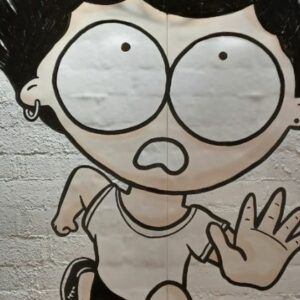On 23 September we’re marking Celebrate Bisexuality Day, the goal being to recognise, promote and celebrate bisexuality and respond to the marginalisation and prejudice towards bisexual people, whether from the LGBTI community itself or from outside this realm. The date was first established in California in 1999.
Here at the Barcelona LGBTI Centre we’ve been working on various activities to combat biphobia and rethink things relating to bisexuality. Projects include:
Exhibition “Desbiada”
A huge plane was suspended between the walls of the LGBTI Centre from May to July 2022. It represented the threat of monosexism, in other words, prejudice based on the idea that people’s desire can only be geared towards one specific gender. Next to the plane flew clouds representing other stigmas and prejudices, from both heterosexuals and members of the LGBTIAQ+ community itself. And worse still, when trying to escape these threats the path was strewn with obstacles: the stones of biphobia.

The installation “Desbiada” was the work of Maria Queraltó, author of the comic Me cuesta bi-vir,which offers a comical perspective of the experiences of a bisexual person and the biphobia they’re forced to confront in their everyday life.
If you were unable to visit the installation, remember that Me cuesta bi-vir is available on loan and can also be consulted at the Centre de Documentació Armand de Fluvià, on the top floor of the Barcelona LGBTI Centre.
Books for rethinking bisexuality
Published at the start of 2021, this publication has already become a classic for reflecting on the specific forms of violence shown towards bisexuals, and how to combat them through activism. Resistencia bisexual. Mapas para una disidencia habitable, by Elisa Coll, moves “between research and life experience to offer a personal yet political approach to bisexuality as a constantly dissident identity, beyond desire and in open resistance to structural violence”.
The book is available on loan or for consultation at the Centre de Documentació Armand de Fluvià. If you’d like to know more, take a look at the presentation from the author at the LGBTI Centre: Presentation Resistencia bisexual. Mapas para una disidencia habitable
Another significant book for understanding bisexuality is Cuerpos sexuados. La política de género y la construcción de la sexualidad, by Anne Fausto-Sterling, published in Spanish by Melusina and also available at the CDAF.
From Latin America we have Bisexualidades feministas: contrarrelatos desde una disidencia situada, published in Buenos Aires in 2020 and also available at the centre.
We also have other books in English, such as Bi: notes for a bisexual revolution, by Siri Eisner and Claiming the B in LGBT: illuminating bisexual narrative, by Kate Harrad.
You can find the full catalogue for the CDAF here: https://media-edg.barcelona.cat/wp-content/uploads/2022/02/16133510/Butlleti-de-novetats_2021-2.pdf
Discussions, meetings and alliances
Biphobic violence often goes unnoticed, and there are still many stereotypes around bisexuality. How can activism tackle these stereotypes and forms of violence? Can sisterhood alliances be generated between bisexuals and lesbians to establish connections in diversity?
The activists Irene Blanco Fuente, Elisa Coll, Agostina Invernizzi and Elena Longares spoke about these possible alliances in this round table at the LGBTI Centre: Bi-lesbian alliances: Highlighting violence and creating settings for sisterhood and resistance
At times, the history of bisexuality seems to be shaped by a lack of knowledge about its role models. This round table tried to highlight the paths and contributions of people in history who were role models as bisexuals. The participants were Elena Barceló, historian and Medievalist; Cristina Arroja, art historian and writer, and Miguel López-Guadalupe, professor and Medieval history researcher with the Universidad Complutense de Madrid. View the session here: Referents Bisexuals en la Història
